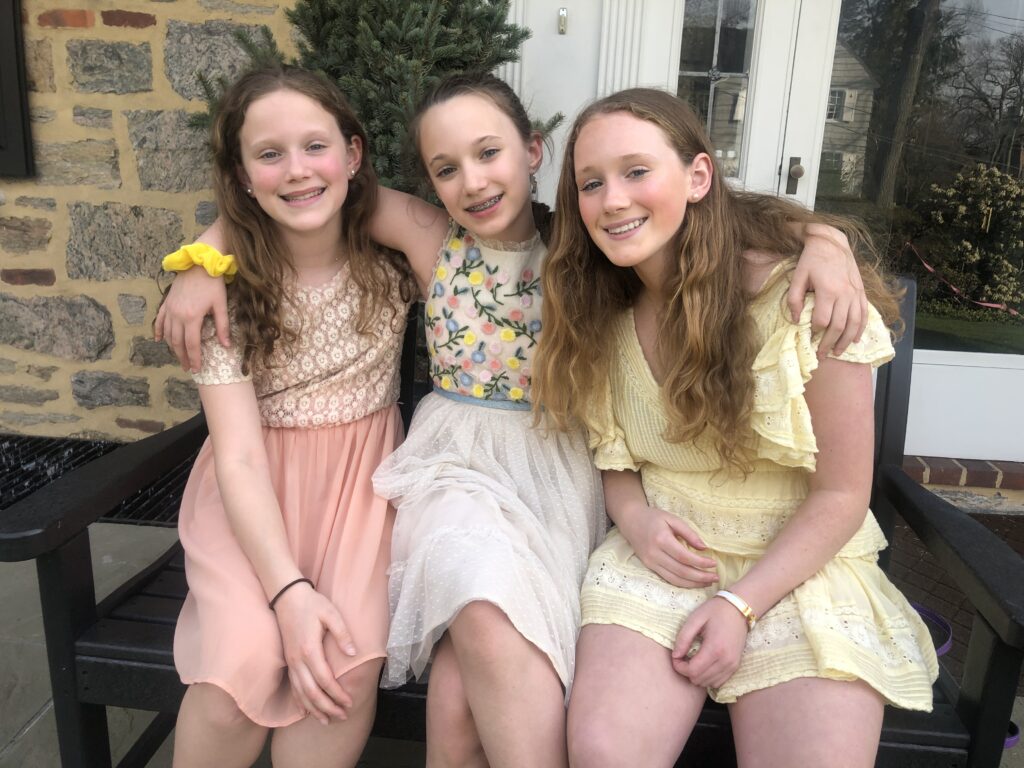
By Melissa Errico
I was weeping. Not just crying, or quietly tearful—but full out shoulder-shaking and wracked with sobs, alone in my seat in a suburban movie theater. My three young daughters—the oldest, 13, the twins, 11—and I had just seen Greta Gerwig’s wonderful adaptation of Little Women, and they were surprised—maybe even alarmed—by my reaction. Oh, I react to plays and movies that move me—my friends tease me about being a “real emotional girl” after the Randy Newman song I love to sing—but this was, even I knew, something else. I sat in my seat, overcome by an emotion whose purpose or source I could hardly explain or recognize. Was it nostalgia for something past? The world depicted seemed so remote from my usual one, where I was getting ready to go on the road with a series of concerts singing the songs of my mentor, Michel Legrand. The tour was to take me throughout America and on to London and Paris, and while this is not quite as glamorous as it may sound—a lot of small hotel rooms and rented gowns and sleepless nights in strange beds—still, I won’t pretend it doesn’t sound glamorous.
And then, scarcely a month later, the coronavirus crisis fell from the sky and everything was canceled and the world locked down and there we were, in that lost world, scarily exact. Four women, mother and daughters, alone in a suburban house on the East Coast of America, with me suddenly Marmee, raising three daughters in pure 19th-century style. There was daily laundry to do and cooking to execute—I had never even unboxed the Cuisinart we’d gotten as a wedding gift—books to read out loud and lessons to do, and all this in a fatherless house. My sensitive Beth of a daughter, Diana, a girl who can sense everyone’s moods and is often the peacemaker, recognized it at once: “This is just like Little Women,” she said, “only with Dad in the basement instead of at the Civil War.”
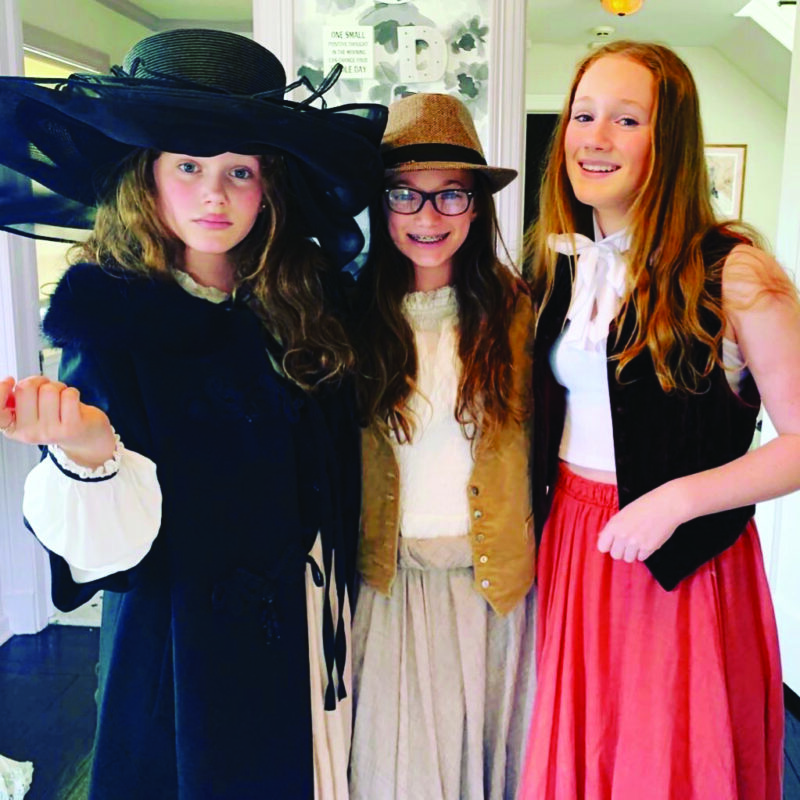
Well, the basement he was in was a kind of war zone, really, where he was fighting a noble battle—against the virus itself. The basement was the only place I could think of to put him. It was March 20 after dinnertime, and my husband seemed limp. He had been coughing for a few days and had had a disturbed night of sleep. I found him in our living room in the center of the sofa, seated and still. “I haven’t been feeling well. I am sick. And now, I have a fever,” he said quietly. I went upstairs quickly and got the thermometer for the ear from the closet in Diana’s room. The shelf had other thermometers also, for under the tongue—some seemed dead; two were in Celsius. I needed a temperature. Suddenly I was furious! Where is the simple thermometer from the 1970s that is glass and goes under your tongue and is accurate? I took the whole plastic box downstairs with six different modern battery-powered digital thermometers, put one in his ear, and pushed buttons at random. I imagined, with rage, Googling the Celsius equivalents, wanting to know if I was seeing a fever like 101 or 103…not 39 or whatever…. My impatience made me switch gadgets too quickly and soon his face was being attacked from every angle. Finally, I found the simplest one, which went under the tongue. Back to the basics I had seen work as a child. Lift the tongue and wait.
It read 101. I looked at him and said, “I guess we have to treat you like you have the coronavirus until we know.” I called Victoria in what can only be described as a serious mom voice. I met her in the basement, and, with an arm full of Tylenol bottles, cough syrups and hand sanitizer, I assessed the corner space, which had been a sort of still-unused but designated “man cave” for the past three years since we had, semi-reluctantly, left our 23-year life in lower Manhattan. Certain areas of the house just hadn’t been used or settled into. This was one of them, and now it was the most important corner ever. There was his desk and a pull-out sofa, and a TV. Tennis memorabilia filled windowsills, the Patrick McEnroe Wheaties box he once appeared on was sitting on a shelf, and there was a gallery wall of framed photos including a cover of Tennis magazine from the early 1980s where Patrick looked something like George Michael. Victoria is my tennis-playing Jo, with the same warrior nature, in which Jo and other girls did sports “to practice the graceful bound by which every girl expected to save her life some day when the mad bull, which was always coming but never seemed to arrive, should be bellowing at her heels,” quoting from Jo’s Boys, the final volume in Alcott’s Little Women series. Well, the mad bull was here, and making this bed was our best defense. After struggling over the angle of the elasticized bottom sheet, we made him a nice bed. She looked satisfied but shell-shocked and I tried to correct myself, being cheerful and matter-of-fact about our haste. I was thinking, Is 14 too young for this? But weren’t medieval queens already hard at work running France by her age? I couldn’t hide all this from Victoria. I needed her help. I watched her grow up in those 10 minutes.
I called my parents. My father—an 80-year-old Italian American, a surgeon and a Vietnam vet—became all those things but in reverse order. “Find a shower curtain,” he said. “Nail it to the wall if you have to,” charmingly added my mother, who lived through Vietnam with a newborn child. “You don’t want cloth. You don’t want moisture to get through. You don’t want to clean it.” I have no idea what Crazy Moment Angel descended that second, but I reached to the bottom shelf near the laundry machine, and my hand fell on a large new white shower curtain, folded and waiting. I have no idea who bought it, how I knew it was there. I did know where the hammer was, and I started taking nails and creating a vinyl wall.
My 50th birthday was approaching, a time at once terrible and opportune. In the months before, I had become simply staggered by the momentum of life, as if my hair were permanently swept behind me by a wind in which I was caught. And my children were moving too, constantly, from suburbs to city, from school to tennis courts, on highways and cars and occasional carpools. Connections were so exact that we would plan to meet in certain parking lots so the car a child was jumping into would already turn onto a road facing the correct direction toward a freeway entrance. There wasn’t even time to do a U-turn. My three daughters had laid out their interests—ballet, music, tennis—and though they were hardly too many disciplines, the trend is to take at least one activity three or more times a week. Can I ever just have my kids home? I’d thought. What would it be like if I just had a whole summer alone with my family?
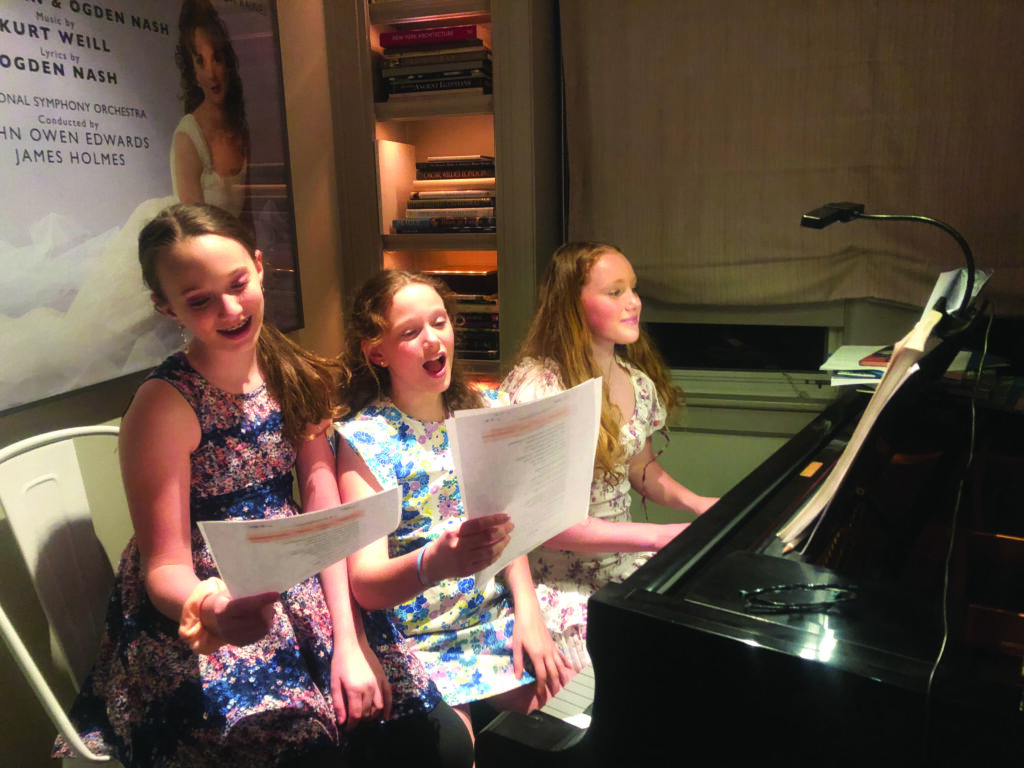
Suddenly, that prayer was answered. I don’t remember the day of my birthday, but I do remember what we called my birthday party at the kitchen table—one of the last moments of the quarantine where the four of us sat at the kitchen table for dinner. In the months that followed, we began to use the dining room, which we had never used at all. During one of our first meals there, Juliette, my pretty, artistic and prickly Amy, said, “We never use this table. I think I’ve only been in here on Christmas and Thanksgiving.” Truthfully, we used the table every day—but as a place to leave book bags and dance bags and school instruments and school forms. It had been a place to drop and collect the accoutrements of the next action. The house is small and the dining room is near the front door—and the front door, until now, had been the hearth. Everything used to circle around that front door—the main theme of every day being: Where you are going and where you are coming back from. Now the table was to become re-formed as a, well, table where you sit down and eat.
Meanwhile, his struggle down in the basement coincided exactly with my first week of homeschooling. On the first Monday, I didn’t know what a line of demarcation was. I said, “Oh that’s geometry!”…only to find out it was geography. I had to start to pay attention. Once I realized the virus was simultaneously stopping the world and had already arrived in our house, my instinct was to have a schedule. I thought about time even before I thought about germs. I thought about structuring time and immediately set expectations: beds made, wake-up time, cleaning rules, and created, with my child who is most resistant to militarism, a calendar for the entire house for cleaning. Enlisting her turned out to be a good idea because she took some satisfaction out of having written the rules she was bound to resent. “Toilets on Friday,” for example.
My days were immediately dominated by being late for various Zooms, and consulting a large dry-erase board I converted into a family planner. I had to organize bodies in motion before I could even fathom the invisible pathogen of this coronavirus. As much as before, but now inside the house, I thought where they needed to be next, and how to get them there. Cleaning became the next priority in my first triangle of concerns. I had a bottle of Clorox. I diluted it in a bucket and started to wash surfaces, all day, but with a kind of grand closure at 8PM, after dinner and before I turned off the kitchen light. The beginning of this virus was all about washing hands. My thinking went from my hands to…where else is this virus? And where had Patrick been this week? Incessantly, I washed my hands, surfaces, even (my own invention) my nose with soap. I monitored the kids and had them shower more often, especially after they helped clean the house. I opened windows in some sort of old-fashioned gesture, believing the wind would bring health, the cool air could cleanse. I was suddenly a colonial mother who was also glued to the television and the internet. I invented ideas of wellness to pass to three young girls who looked to me for direction. I said everyone needed fresh air, and a walk after dinner. I shared what I had read and told them to drink less ice, and offered them tea at night. My kids tried everything I proposed, and I had them watch (literally) five minutes of news each night at 6PM, so they would know we were doing what we had to do. Little acts of control made them less afraid. What we could do, we would do! And we were being asked to stay home, to help the country, to help older people, to help all people, to help hospitals, and we would. And Daddy was not too sick, but he had to be serious and so we would be serious. We had to run our house.
But I also knew we needed something frivolous to happen, to make the days gay. And so, I started a cooking show in the kitchen. I had never cooked much in my life, and I called some friends and asked for some basic tips. The first time I tried to make a dish with a familiar but fancy title was on a cold March night when I made chicken cacciatore, after which I set my phone on its side and texted a video to my friend. I leaned into the camera and briefly explained that this recipe is nothing more than pasta sauce with peppers added and sautéed chicken pieces soaked in. Easier than I had thought! I had a glass of wine in one hand and an apron on. It was 14 seconds of video and I was tipsy and exhausted. I ended up posting on Facebook and hundreds of people could relate to my exhaustion and enjoyed the apron, and a new view on maybe a familiar actress friend who wasn’t often tipsy and making dinner with no makeup and a bundle of dirty hair. The next night, I was given a recipe from a friend for sweet potatoes with North African spice rub. I filmed it to share it on Instagram, and my daughter walked into the kitchen and joined me on camera as a co-star. I filmed two to three dishes a week and collected recipes and enjoyed some of the backstory from my recipe books—a favorite turned out to be the fact that pesto appeared in an ancient Roman poem by Virgil.
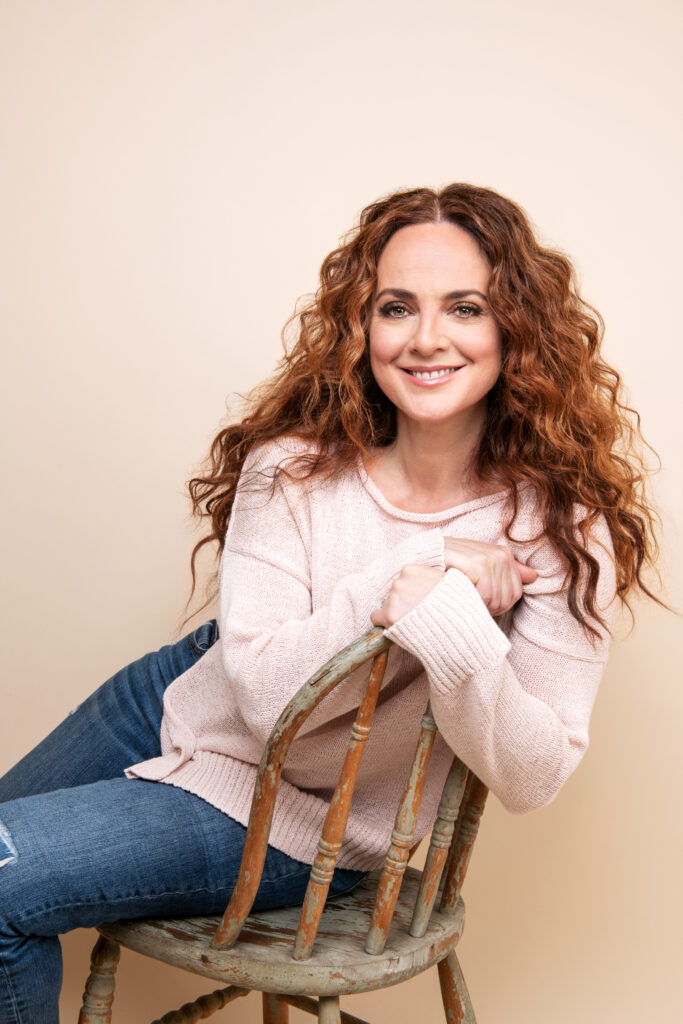
Having a cooking show in our kitchen served a few purposes: One, it was familiar. “Mommy is getting ready for her show.” And “I have a show today. I am printing my script. I am setting up a light. Showtime.” And the obvious other purpose: IT FED THE FAMILY. The next purposes I didn’t exactly know were: the comfort it offered the kids and the way it amused Patrick, who watched me film often from the window outside. My “show” signaled to him and to the girls that all was well, and gave us a way to sit down at night to eat, unified together with the food, if not with our bodies. Needless to say, a really good dinner brought our dining room the pleasures of scent, taste and discussion. The words beef Bourguignon always struck me as pretentious and deeply culinary, a realm bordered by domestic-police tape saying “Do Not Enter.” Well, I made beef Bourguignon!! Which took three days. It was such a good feeling for something to go well that took three days to figure out—and which also took those three days out of the interminable list of days that were starting to stitch to other days.
Patrick’s corona illness was, as so many cases seem to be, both manageable—he never got much worse than on the first night—and severe; he was significantly short of breath for weeks, and it took a long time for him to fully recover. “Away at war,” he became a sort of phantom on the property. We saw Dad on the lawn. He walked the dog, Pepper, and returned. I would see him from my window, or stand at a distance. He stayed cheerful. He went to the New Rochelle drive-thru with only Pepper for company to get a test. His result came back in 24 hours and he was indeed confirmed positive for COVID-19. We spent a total of three weeks passing meals under the shower curtain and smiling through windows. A man who has never figured out how to use our family printer, or really any other gadget, was in the basement all day—and I reminded him that his lifelong dream of having a podcast was in a box down there. He actually owned a podcast machine. With that isolation and with Pepper’s steady and loving gaze, Patrick launched Holding Court With Patrick McEnroe, and between naps and relapses of shortness of breath, he interviewed a host of friends and tennis lovers and started to live a dream of his.
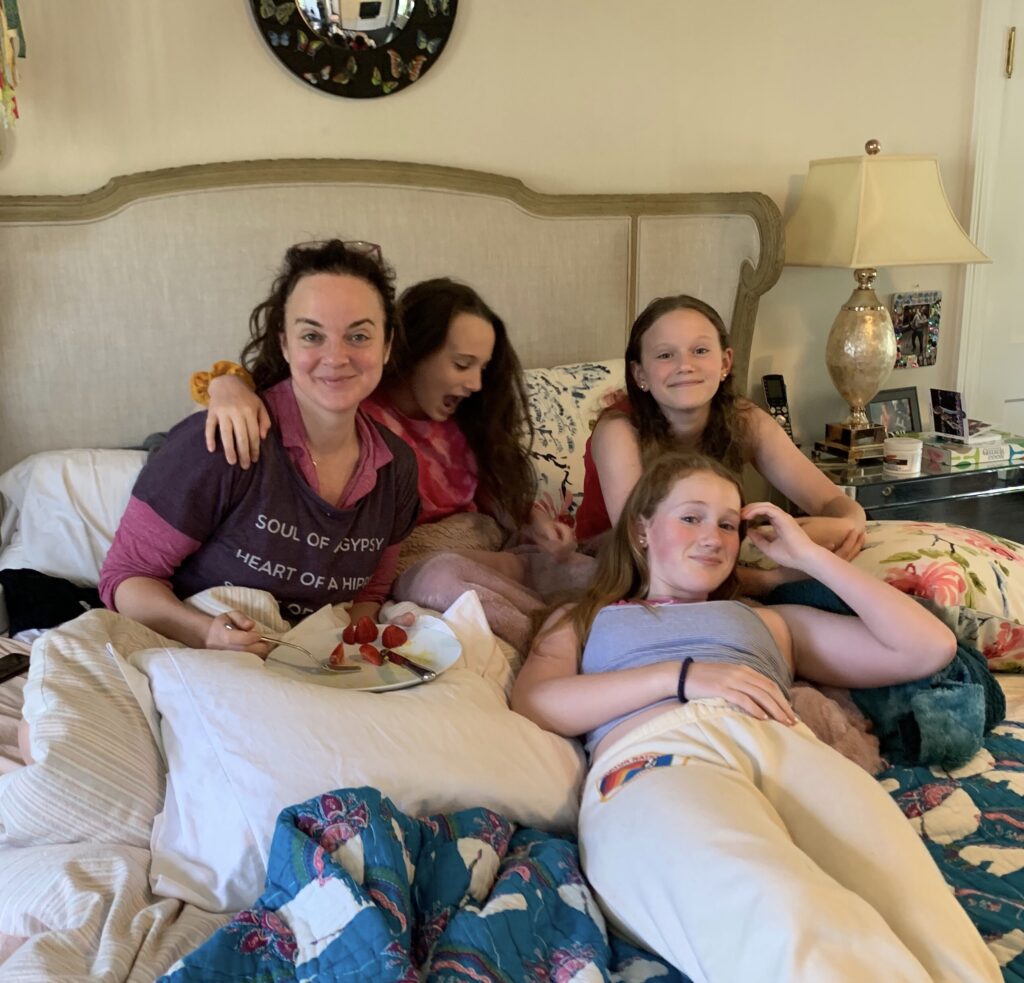
After four weeks he tested negative, and we had a sense that the war was over. Well, that war. But the next war becomes the fact that this virus…globally…isn’t going to end all that quickly. With every passing day, it seems, endurance is the war. How to pace this kind of enclosure. Do I keep our life going as usual, as best I can? Do we keep taking ballet? I can’t think why we would stop. I have to keep their lives resembling their lives. So, we have ballet, they make murals on the street in chalk. Juliette painted a section of the driveway with permanent acrylic paint, by mistake—she didn’t know it was permanent—so now her large white square filled with hand-painted daisies sits on our otherwise black driveway as a tattoo of this time of hardship and painted daisies. There are more cooking shows, and pointe shoes, and I learned to do haircuts, and all three are tie-dying T-shirts in the basement sink. There have been some emotional fights. The broken vacuum was a saga. We are a family like every other family, and we hurt and we heal and we hang together.
The movie and book still haunt me. I’ve learned since that Bronson Alcott, the father of the family, who is presented in his fictional role as missing from most of the action, was actually present in the house throughout the war, while it was Louisa—“Jo”—who went to Washington, D.C., as a nurse: In her book, she made the passive man of the house into the one who had gone to the front to minister to the soldiers. It was only the success of his daughter’s book that then allowed Bronson, a pioneering abolitionist, the freedom to pursue his utopian educational plans (access to schooling regardless of race). Louisa’s imagination supported her Dad’s idealism. As a novelist, she rewrote her own father, making him bolder, getting him, imaginatively, out of the house—closer to the battle for racial equality.
It’s one more way in which the novel of Little Women, when you think about it, is hyper-contemporary. It seems to be about old-fashioned comfort, but on closer inspection is really about the muscular struggle of ordinary middle-class people to survive a series of crises—the Civil War, a pandemic of scarlet fever—while accepting that it will be a struggle, with everyone divided inside herself. My three daughters feel like four. Maybe it is four because in some way, I am a sister and a mother. I am Jo sometimes, and I am Marmee, though in the past I was often mistaken for a Meg. I drift between roles, and my daughters know it, and they, too, drift between roles themselves. Sometimes Diana is Jo, sometimes Beth, everyone is sometimes Jo. Juliette doesn’t see how Amy she is, and that is OK. They all long to be Meg, because of course Meg has the most princess-like life and the prettiest frocks. There is, I see now, a cure, a medicine, in a story—and sometimes the cure comes when we don’t know what the illness ahead may be. Part of me is still seated in that movie theater crying. I see now that watching the movie, I wasn’t sure if what I was responding to might be longing for the lost world of Little Women. Now, I know that it’s the opposite: I was longing for the chance of the future world where the same good values and hard work could hold, where my daughters and I could inhabit the characters, embody their struggles, become little women…which means, big ones.
They did a scene from Little Women for Mother’s Day, but we ran out of time to do more. In the one scene they performed, Jo was saying how men are a trap and how flirting is only going to get you nowhere. But there was also fun talk about getting dressed up nice, and Laurie entered. Diana, as Amy and Laurie, courted herself, and will presumably in the next installment have to save herself from the ice. I hope Mother’s Day lasts a few weeks and that my busy fairies will find time to do the play even if one run-through takes a few sessions, even if it takes a summer. Things are different in show business now, even in this show. A one-hour production may take weeks and I will still follow the story, as it’s my story to fill in anyway, hour by hour—the solidarity of the four of us, carpentering every day. Quietly inside me, my own threads of yarn sew my heart together, as it unravels for the discomforts and unease of the world. Yarn that pulls my heart wider; that stitches and mends and knots and collects, days upon days, colorful, as these girls unroll to me in their individual unguarded splendor and honesty of self. I can’t tell if the days are long or short. Day turns to lunch to laundry to eternity to brevity.





